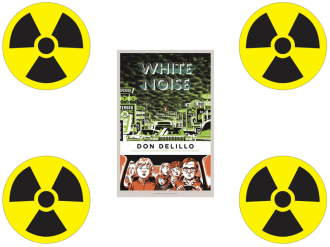
In my opinion, life is too short to waste on bad fiction. So, when it comes to my leisure reading, I stick to authors I know well that rarely disappoint me, I refer to “The Greatest Novels of _______” style lists, or trust the word of a good friend whose opinion I respect. I learned of White Noise several years ago while reading one of those aforementioned lists that boasted the 100 greatest novels of a certain period of time. I do not claim to be highbrow, so a list like this one isn’t an automatic sell for me. Honestly, I feel this review will probably make me sound like an idiot incapable of reading anything resembling an intellectual stretch. Make use of the comment section below if you’d like to agree. Really, all I am trying to say is, I don’t like this book. I’m glad I read it, but I’m more glad I don’t have to again.
When I read the word “Novel” printed on the front of a book, a few things come to mind. At the top of that list is story. I open a novel, with the idea that I am going to read a story. And since I have gone thousands of dollars into debt to be knowledgable about such things, I don’t even necessarily expect to have a beginning, middle, and end. But I do expect story. Take Pynchon’s The Crying of Lot 49 for example. Sure the book doesn’t give us point A to point B directions, and we get lost several times, and we are even left with more questions than we started out with, but it’s one hell of time we have as a reader, and that is thanks to Pynchon’s sheer joy at concocting wild scenarios for the main character and the reader to experience and hopefully enjoy. White Noise, on the other hand, a book that weighs in at a little over 300 pages, could have been compacted into a 30 page short story. What’s more is that it could have done this and still carried the philosophical weight that DeLillo shifts around like a beer belly.
There are some great philosophical buttons pushed in this book, points that I have pondered and even have kept me up at night. How is technology effecting society? Can we recover from how bad we treat the environment? When will we go too far? When will I die? How can I not focus on death? Is there a way to avoid dying? Holy shit, death. Death, death, death. It lurks around every corner in our life, and DeLillo does a great job making sure it lurks around every page of his novel.
So, with such topics, how could I not like this book? It comes back to a matter of story. Instead of characters dealing with these issues by way of plot devices and story lines, the reader is presented with long, albeit very deep, dialogues and internal monologues about them. Outside of two chunks of the book (one of which happens 100+ pages in, the other in the last 20 pages, both of which are excellently and intensely written) we are bored to death by two dimensional characters having four dimensional conversations. Instead of an Atticus Finch or Charles Darnay, we get Murray, who somehow manages to bore the reader with a sociopathic diatribe about how the only way one can truly conquer his fear of death is by murdering someone. Conceptually, for a novel, such things are gold mines, but the execution is dismal.
And that about sums up White Noise. There is so much potential with this book. Airborne Toxic Events! Murder! Sex! But the path that weaves through these events is so meandering and drawn out, that it really takes the wind out of the sails by the time the reader is in view of his destination.